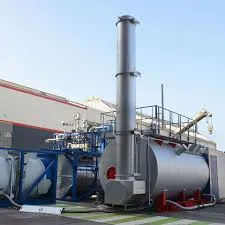
Nov . 23, 2024 11:55 Back to list
thermal oil boiler design
Thermal Oil Boiler Design Key Considerations and Features
Thermal oil boilers are essential components in various industrial processes that require reliable heating solutions. Unlike traditional water-based boilers, thermal oil boilers use heat transfer fluids to achieve high-temperature operations efficiently. This article delves into the core aspects of thermal oil boiler design, emphasizing their significance and operational benefits.
Understanding Thermal Oil Systems
Thermal oil boilers operate on a distinct principle where synthetic oil, or other heat transfer fluids, circulates through the system. These fluids have high boiling points, allowing for maximum heat transfer while minimizing evaporation losses. As the thermal oil absorbs heat from the combustion of fuels or through electric heating, it transfers this heat to the heat exchangers, heating other fluids or materials in the process.
Key Design Considerations
1. Heat Transfer Efficiency A crucial element in thermal oil boiler design is optimizing heat transfer efficiency. This includes selecting suitable heat transfer fluids that can withstand high temperatures and providing effective heat exchange surfaces.
2. Material Selection The materials used in constructing thermal oil boilers must resist high temperatures and corrosion. Stainless steel, carbon steel, and specific alloys are commonly employed to ensure durability and safety.
thermal oil boiler design

3. Safety Features Given the high operating temperatures and pressures, safety is paramount. Modern thermal oil boilers are designed with safety valves, thermal expansion tanks, and comprehensive monitoring systems to prevent overheating and pressure build-up.
4. Control Systems Efficient operation relies on sophisticated control systems that regulate temperature and flow rates. Automated control mechanisms enable precise adjustments, enhancing operational efficiency and energy savings.
5. Modularity and Maintenance A modular design allows for easier maintenance and upgrades. As industries evolve, the ability to adapt the thermal oil system to new requirements without extensive overhauls proves invaluable.
Applications and Benefits
Thermal oil boilers are widely used in industries such as food processing, chemicals, and textiles, where precision heating is essential. The advantage of thermal oil systems includes reduced energy consumption, lower operational costs, and enhanced process stability. Furthermore, they offer flexibility in terms of fuel use, including natural gas, diesel, and biofuels, allowing industries to choose sustainable energy sources.
Conclusion
The design of thermal oil boilers plays a crucial role in their efficiency and application in various industrial processes. By focusing on heat transfer efficiency, material durability, safety features, advanced control systems, and maintenance capabilities, the thermal oil boiler stands out as a vital heating solution in modern industry. As technology advances, the future of thermal oil boilers looks promising, paving the way for even more efficient and reliable energy systems.
-
High-Efficiency Commercial Oil Fired Steam Boiler for Industry
NewsJul.30,2025
-
High-Efficiency Biomass Fired Thermal Oil Boiler Solutions
NewsJul.30,2025
-
High Efficiency Gas Fired Thermal Oil Boiler for Industrial Heating
NewsJul.29,2025
-
High-Efficiency Gas Fired Hot Water Boiler for Sale – Reliable & Affordable
NewsJul.29,2025
-
High Efficiency Biomass Fired Hot Water Boiler for Industrial and Commercial Use
NewsJul.29,2025
-
High-Efficiency Biomass Fired Hot Water Boiler for Industrial Use
NewsJul.28,2025
Related PRODUCTS






















